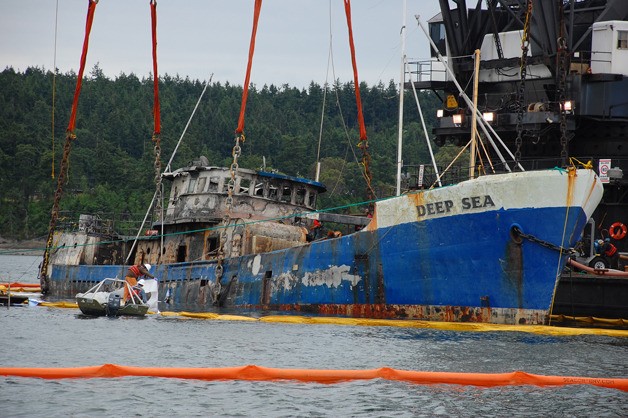The 2012 sinking of the F/V Deep Sea in Penn Cove is once again making waves across Washington.
On Wednesday, Gov. Jay Inslee for the second year in a row signed into law legislation aimed at combating the state’s ongoing derelict vessel problem. The bill, 2SHB 2457, follows on the heels of a bill passed in 2013 that addressed the same issue and was crafted in response to the Deep Sea’s sinking.
The new rules are an environmental victory for Puget Sound, said Rep. Norma Smith, R-Clinton, and sets an example for other coastal states struggling with the issue.
“This truly is landmark legislation,” said Smith, in an interview Thursday with The Record.
“This isn’t just a crisis for Washington, it’s a crisis for all coastal communities … This really does raise the bar for owners and sellers,” she added.
Key elements of the legislation prohibit the sale of “unseaworthy” vessels older than 40 years and more than 65 feet in length. And those that can be sold must have insurance at the time of the sale.
The new law also requires moorage facilities and owners of vessels secured at these locations to carry marine insurance.
In May 2012, the 140-foot crab boat Deep Sea caught fire and went down just outside Penn Cove Shellfish’s mussel rafts, spilling thousands of gallons of diesel fuel.
The old boat, owned by Renton resident Rory Westmoreland, had been illegally moored for months and was uninsured. State and federal efforts to contain the spill, raise and dispose of the derelict vessel would cost taxpayers $5.4 million.
The event made headlines across Washington and sparked legislation in 2013 to aid the state Department of Natural Resource’s Derelict Vessel Removal program.
It preserved what had been special, one-time funding for the program, but also stiffened existing rules concerning derelict vessels. It also required a work group of legislators and state agency staff to convene after the session and develop a list of solutions for the ongoing environmental problem.
At the time, Vessel Removal Program Manager Melissa Ferris said the state was aware of about 165 problem vessels. The current number could not be verified as attempts to reach Ferris on Thursday and Friday were unsuccessful.
The legislation Inslee signed into law this week, parts of which go into effect this year and others on Jan. 1, 2015, also establishes an annual ‘derelict vessel removal fee’ of $1 per foot on commercial vessels that are required to be listed with the state Department of Revenue. The money will go into the state’s Derelict Vessel Removal Account.
Also, the law exempts vessel deconstruction activities from the retail sales and use tax, and creates new penalties for failing to register a vessel.
Inslee hailed the recent legislation, and the state’s derelict vessel program, as a great success for Washington and other states.
“DNR’s Derelict Vessel Removal Program is an award-winning model for the rest of the nation,” the governor said in an April 2 news release. “This legislation is significant, not only because of what the bill does, but how it galvanized both sides of the aisle and a diverse group of stakeholders to develop workable solutions.”
According to the release, the list of solutions drafted by the work group was later presented “to a diverse group of stakeholders representing the commercial and recreational vessel industries, environmental groups, and ports.”
Commissioner of Public Lands Peter Goldmark also applauded the “collaborative work” while singling out Smith and Rep. Drew Hansen, D-Bainbridge Island, for their efforts.
The South Whidbey lawmaker and Hansen spearheaded the bill. Smith, who also played a key role in the development and passage of the 2013 legislation, said it was a collective effort and that the work group gathered weekly for months to generate the list of solutions.
“I’m just thrilled it got signed into law,” Smith said.
“We’re hoping this is really the foundation for change,” she added.



